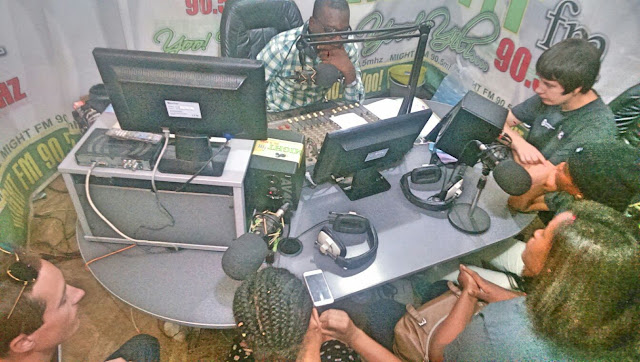Cycling to work every morning never gets easier; the thick
sand makes cycling more of a chore, which is made even harder in the presence
of the hot rising sun and the dry, dusty air. When we finally meet the smooth
track of the main road it then becomes an obstacle course of giant potholes and
steering around the many people and bicycles coming our way.
While I struggle to cycle the relatively short distance from
my home to the office, I see women carrying huge basins of water on their
heads, walking swiftly without spilling a drop, all the while their babies
sleep soundly, tied to their backs. How far is she having to carry that water? How
often does she have to do this? And how in the world is she carrying it all
without spilling it?!
| Local women walking back from fetching water. They have to travel quite far with the heavy containers. |
It is currently the dry season in Ghana, otherwise known as Harmattan,
and the shortage of water in the area means many pumps are running dry and some
local taps have even been turned off. This
is the first time in my life that I have been excited about the thought of
rain.
In a climate like this, it is hard to believe that water
covers 70.9% of the Earth’s surface. Of this, 97% of water on Earth is salt water,
whilst water found in lakes, rivers, streams, ponds, swamps, etc. accounts for
only 0.3% of the worlds fresh water. The rest is trapped in glaciers on in the
ground-too far down for most of the water pumps in Savelugu to reach.
| Broken water pump in one of our communities, the area is not well maintained and is a long walk from the community. |
All the communities that we work with here in Savelugu have
ongoing problems with their water sources. The bore holes and pumps they have
installed are easily damaged, and not so easily repaired. Some communities even
find that their source of ‘drinking water’ soon becomes salty. These unreliable
sources of water keep the community member alive in many ways; the water is not
just for drinking, but is also used during rice production, for making soap and
throughout the processes of producing shea butter.
These same communities are advised to irrigate their land by
recycling their waste water, to use their water sensibly and not to take
advantage of their limited supply. So why don’t we all do that at home? Why
don’t we value the water we have as much as they are expected to? In many
countries around the world people complain about regular rainfall, and don’t think
twice about their easy access to clean drinking water. If we all started
valuing water a bit more, then maybe we could improve the availability of clean
water for more people around the world.
| Dam in Savelugu where many people fetch water for washing, cooking and drinking |
748 million people still do not have access to an improved
source of drinking water, and some 1.8 billion people in the world continue to
drink water that is contaminated with faeces. 2.5 billion people do not have
use of an improved sanitation facility. Maybe these all just look like some
random statistics that don’t affect you, but if you were one of these millions
and billions of people who relied on unsafe wastewater to drink, clean and cook
with, maybe you would think twice about how you use the water available to you.
In 1993, the United Nations General Assembly designated the
date of March 22nd as the first World Water Day. This day is not
just for awareness raising on water issues, but should also be a day we
celebrate the water we have. Today is a day to be thankful, not only for the
water sources around us, but also the fact that this incredibly versatile substance
keeps our human bodies alive! Water is one of the most common substances on
this earth, and continues to be one of the most vital. It is a tremendously
valuable resource, one we are very guilty of squandering and polluting
prodigiously.
By 2030 The United Nations aims to have reached all 17 of
their sustainability goals, one of which is to ensure access and clean water
and sanitation for all people. Despite the high percentage of wastewater in the
world, there is sufficient fresh water on the planet to achieve this! As
impossible as it seems, there has been improvement in water quality globally; between
1990-2015, the proportion of the global population using an improved drinking
water source has increased by 15%. This goes to show that we can make positive change
to the way we use water, if we can get more people to realise how valuable
water is to sustaining all life on this Earth.
 |
| Our office door decorated with our Water Day posters! |
Written by Rachel Morgan
(sources: UN.org, UN
World Water Day; EPA Water Sense; EPA Water, treehugger.com)








